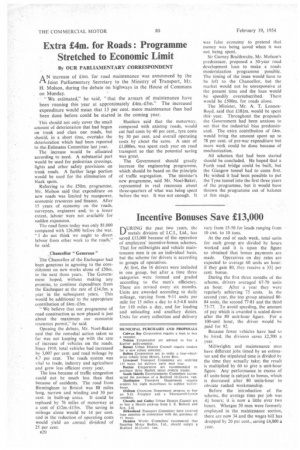Extra Vim. for Roads : Programme Stretched to Economic Limit
Page 54

If you've noticed an error in this article please click here to report it so we can fix it.
By OUR PARLIAMENTARY CORRESPONDENT AN increase of £4m. for road maintenance was announced by the Joint Parliamentary Secretary to the Ministry of Transport, Mr. H. Molson, during the debate on highways in the House of Commons on Monday.
"We estimated," he said, "that the arrears of maintenance have been running this year at approximately £4m.-£5m." The increased expenditure would mean that 13 per cent. more maintenance than had been done before could be started in the coming year.
This should not only cover the small amount of deterioration that had begun on trunk and class one roads, but should, in a short time, overtake the deterioration which had been reported to the Estimates Committee last year.
The increase would be allocated according to need. A substantial part would be used for pedestrian crossings, lights and other safety provisions on trunk roads. A further large portion would be used for the elimination of black spots.
Referring to the £50m. programme, Mr. Molson said that expenditure on new roads was limited by manpower, economic resources and finance. After 15 years of economy on the roads, surveyors, engineers and, to a lesser extent, labour were not available for sudden expansion.
The road force today was only 81,000 compared with 126,000 before the war. "I do not think we ought to divert labour from other work to the roads," he said.
Chancellor " Generous " The Chancellor of the Exchequer had been generous in agreeing to the commitment on new works alone of £50m. in the next three years. The Government hoped, without making any promise, to continue expenditure from the Exchequer at the rate of £14.5m. a year in the subsequent years. This would be additional to the appropriate contribution of £4m.-£5m.
" We believe that our programme of road construction as now phased is just about the maximum our economic resources permit," he said.
Opening the debate, Mr. Noel-Baker said that the remedial action taken so far was not keeping up with the rate of increase of vehicles on the roads. Since 1910, total vehicles had increased by 3,007 per cent. and road mileage by 4.7 per cent. The roads system was vital to trade, industry and agriculture and grew less efficient every year.
The loss because of traffic congestion could not be much less than that because of accidents. The road from Birmingham to Bristol was 88 miles long, narrow and winding and 30 per cent, in built-up areas. It could be replaced by 76 miles of motorway at a cost of £12m.-£15m. The saving in mileage alone would be 14 per cent. and in the reduction of operating costs would yield an annual dividend of 25 per cent.
5120 Hauliers said that the motorway, compared with existing roads, would cut fuel costs by 40 per cent., tyre costs by 30 per ceni and overall operating costs by about the same. A sum of £1,000m. was spent each year on road transport so that the potential saving was great.
The Government should greatly increase the engineering programme, which should be based on the principle of traffic segregation. The minister's new programme, said Mr. Noel-Baker, represented in real resources about three-quarters of what was being spent before the war. It was not enough. it was false economy to pretend that money was being saved when it was not being spent.
Sir Gurney Braithwaite, Mr. Molson's predecessor, proposed a 30-year road development loan to make a roads modernization programme possible. The timing of the issue would have to be left to the Chancellor, but the market would not be unresponsive at the present time and the loan would he speedily oversubscribed. There would be £500m. for roads alone.
The Minister, Mr. A. T. LennoxBoyd, said that £181m. would be spent thisyear. Throughout the proposals the Government had been anxious to see that the industrial bias predominated. The extra contribution of £4m. would bring the amount spent up to 78 per cent, of pre-war expenditure but more work could be done because of mechanization.
All schemes that had been started should be concluded. He hoped that a Forth road bridge could be built, but the Glasgow tunnel had to come first. He wished it had been possible to put the Tyne tunnel into the first three years of the programme, but it would have thrown the programme out of balance at this stage.




























































































